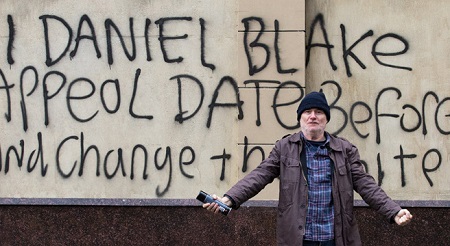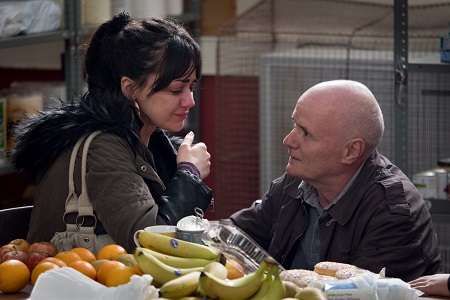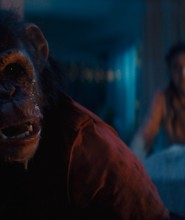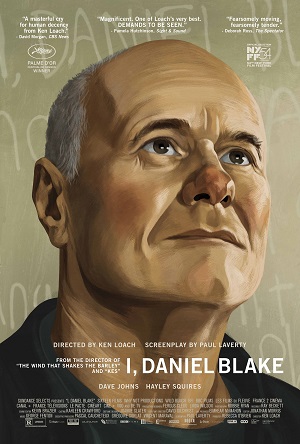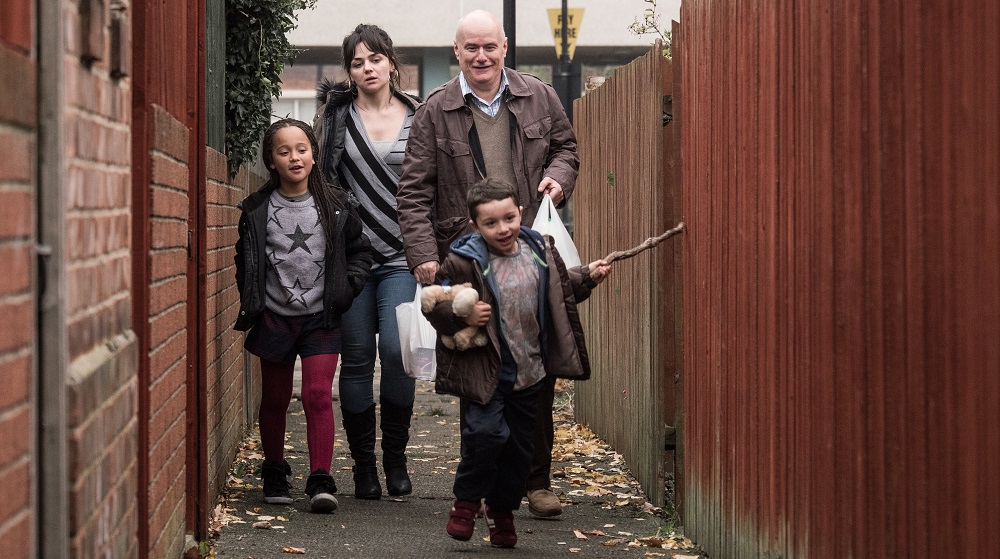
Loach’s Daniel Blake Refuses to Mince Words
Ken Loach does not mince words. His films, works like Kes, Raining Stones, The Wind That Shakes the Barley and Jimmy’s Hall, are spotlights zeroing in on hard truths and even more uncomfortable realities, his numerous forays into British working class realities past, present and future eviscerating in their pursuit of intimate authenticity.
Loach’s latest, the Palme d’Or-winning drama I, Daniel Blake, written by frequent collaborator Paul Laverty (The Angels’ Share), is both inspiring and infuriating, oftentimes both at once, events building to a debilitating conclusion that had me choking back a tsunami of tears. A story depicting what life is like for those eking out an existence day-to-day as best they can, even when society at large seems to be against their very existence, the movie builds with diligent majesty, saving its most savage critiques for the very end.
Daniel Blake (David Johns) is recovering from a serious heart attack. A seasoned carpenter and construction worker, he’s got over 40 years of experience getting things done with his hands. But, right now, his doctors will not let him go back to work, and as such he’s forced to live via government assistance in order to pay his bills, keep his cupboards filled with food and make sure a roof stays over his head.
After some sort of bureaucratic error by his medical provider, Daniel’s benefits are cut off and are put under some sort of official review. When he goes to the resource center for clarification, he’s initially given the cold shoulder followed by the pencil-pushing runaround. Worse, when Daniel does finally get help, it’s to tell him he needs to be out looking for work in order to keep receiving benefits, even though doing so clearly goes against his doctor’s orders.
It’s easy to see where this is going, but Loach and Laverty still manage to make it feel surprising, as if every obstacle that arises is coming out of left field even if they all are forgone to the point of being a cliché. Daniel wants to work but can’t because of his heart, yet he still must go out and pass his resume to potential employers even if he cannot accept a position if one ends up being offered him because he isn’t medically cleared to do so. It’s a series of catch-22’s only made worse by the man’s age, the patronizing indifference he gets from those at the resource center and his own stubborn pride. There’s virtually no way for him to win, and Daniel cannot help but feel like this red tape boondoggle is designed expressly to make sure none of those in need ever receive a single dime in assistance.
There are a couple of key subplots, the most important being the blossoming friendship between Daniel and Katie (Hayley Squires), a single mother of two recently relocated by the government from London who is finding it frustratingly difficult to get her life in order and to do right for both her kids. What’s great about this part of the story is how playful it can be, how light on its feet, even when things are at their absolute worst. Humor and heartache constantly intermingle, Laverty’s screenplay fearlessly asking the audience to smile just while at the same second they are reaching for a tissue.
One sequence in particular stands out. Daniel and Katie head to a food bank in order for her to get some help. What transpires is heartbreaking in its destructive authenticity. Yet it is also inspiring, showing the best of the human experience as kindness and support beautifully take the place of suffering and regret. Darkness and light fill the screen in equal measure, making this an unforgettable moment that placed my emotions right atop the razor’s edge, perilously leaving them there for the remainder of the motion picture.
The raging clinical heartlessness on the part of the majority of the government workers that Daniel interacts with is a little over the top, as are a couple of extended sequences of his attempting to use a computer in order to fill out forms required for his appeal. As for the gag of being put on hold for an extended period of time only to speak with monotone drones who refuse to offer up any sort of practical help, that’s pretty tired material, and as true as these sequences might be it still felt like I’d seen them all so many times before they couldn’t help but fall a little flat. Yet, as obvious as these moments might be, Loach finds a way to make them resonate with more tenacity and vitriol than expected, their familiarity not dulling the overall cumulative emotional impact whatsoever.
Performances are uniformly excellent, and I adored newcomer Squires during a key scene at the very end where makes certain Daniel gets the final word. There’s also a quietly impactful turn by Briana Shann as Katie’s eldest daughter, Daisy, the youngster having a handful of electrifying moments that took my breath away, her naturalistic delivery something special and ebulliently hint at the greatness to come as she continues to mature as an actress.
But, as one would expect, the success of the film rises and falls with Johns, his performance a thing of poetical genius. Raw, unvarnished, the actor brings Daniel to life with grace and dignity. The pride he feels in a job well done, the shame he is crippled by when someone mistakenly believes he wants nothing more than a handout and not just a tiny bit of help in order to get back on his feet, Johns makes it all come alive. More so, the warm humanity he exudes throughout is marvelous, making the eventual turns the plot itself ultimately takes all the more debilitating and affecting as they are unleashed upon the viewer.
Loach makes his point, this cinematic lecture on the social and political bureaucratic ills that afflict the British working class hardly understated. Yet, like the gifted auteur he is, the director finds a way to make this sermonizing not just palatable, but also entertaining. I, Daniel Blake is an important story, perfect for today’s world, Loach once again proving that, even at 80 years of age, he’s not done telling it as it is, and that’s a wondrous thing indeed.
Film Rating: 3½ (out of 4)

